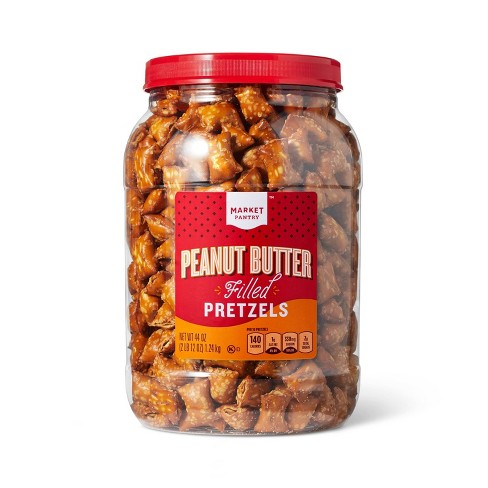Peanut butter pretzels are a popular snack among humans, but can dogs enjoy them too? As a responsible pet owner, it’s important to know what foods are safe for your furry friend to consume. In this article, we will explore whether dogs can eat peanut butter pretzels and discuss any potential risks or benefits associated with this treat.
Are Peanut Butter Pretzels Safe for Dogs?
While peanut butter itself is generally safe for dogs and can even be a healthy addition to their diet, pretzels may not be the best choice for our canine companions. Pretzels are typically high in salt and carbohydrates, which can be harmful to dogs in large quantities. Additionally, the crunchy texture of pretzels may pose a choking hazard or cause digestive issues for some dogs.

Potential Risks of Feeding Peanut Butter Pretzels to Dogs
Feeding your dog peanut butter pretzels can have several potential risks. The high salt content in pretzels can lead to sodium poisoning in dogs, causing symptoms such as excessive thirst, vomiting, diarrhea, and even seizures. Moreover, the carbohydrates in pretzels can contribute to weight gain and obesity in dogs if consumed regularly.
The crunchy nature of pretzels can also be problematic for dogs, especially those with dental issues or a tendency to gulp down their food. Choking hazards and digestive blockages are not uncommon when dogs consume foods that are not easily digestible.
Alternatives to Peanut Butter Pretzels for Dogs
If you’re looking for a tasty and safe treat to share with your furry friend, there are plenty of alternatives to peanut butter pretzels. Here are a few options:
-
Plain Peanut Butter: Instead of giving your dog peanut butter pretzels, opt for plain peanut butter without any added salt or sugar. It can be a great source of protein and healthy fats for your canine companion.
-
Frozen Treats: Freeze peanut butter or other dog-friendly ingredients in ice cube trays for a refreshing and enjoyable treat. You can also find commercially available frozen treats specifically made for dogs.
-
Carrot Sticks: Carrots are low in calories and high in fiber, making them a healthy snack for dogs. They are also great for promoting dental health and can help satisfy your dog’s urge to chew.
-
Apple Slices: Apples are a crunchy and nutritious snack for dogs. Just make sure to remove the seeds and core before offering them to your furry friend.
Conclusion
While peanut butter pretzels may be a tempting snack, it’s best to avoid feeding them to your dog due to the potential risks associated with their high salt and carbohydrate content. Instead, opt for safer alternatives like plain peanut butter, frozen treats, carrot sticks, or apple slices. Remember to always consult with your veterinarian before introducing any new foods into your dog’s diet.
FAQs
1. Can dogs eat regular pretzels without peanut butter?
Regular pretzels, without any added seasonings or toppings, can be given to dogs in moderation. However, it’s important to remember that pretzels are high in salt and carbohydrates, so they should only be an occasional treat and not a regular part of your dog’s diet.
2. Is peanut butter safe for dogs?
Yes, peanut butter can be safe for dogs in moderation. It is a good source of protein and healthy fats. However, it’s important to choose peanut butter that does not contain xylitol, a sweetener that is toxic to dogs.
3. Can dogs have too much peanut butter?
While peanut butter can be a healthy addition to your dog’s diet, it should be given in moderation. Too much peanut butter can lead to weight gain and digestive issues in dogs due to its high fat content.
4. Are there any other human snacks that dogs should avoid?
Yes, there are several human snacks that can be harmful to dogs. Some examples include chocolate, grapes, raisins, onions, garlic, and foods high in sugar or artificial sweeteners. It’s always best to consult with your veterinarian before sharing any human food with your dog.
5. How can I ensure my dog’s diet is balanced and nutritious?
To ensure your dog’s diet is balanced and nutritious, it’s important to feed them a high-quality commercial dog food that is appropriate for their age, size, and breed. You can also consult with your veterinarian to determine if any additional supplements or dietary changes are necessary for your dog’s specific needs.

